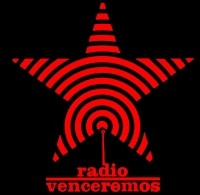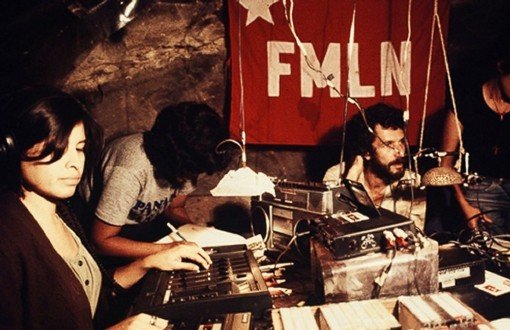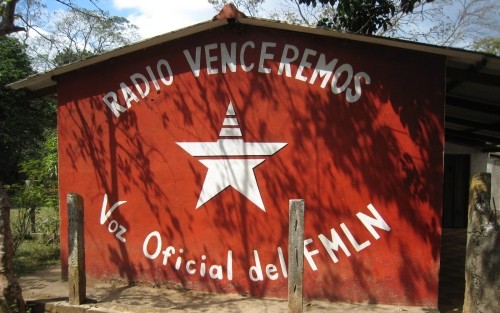Alternative media and radio activist and major proponent of the dissemination of community radios in Latin America, José Ignacio López Vigil is also known for his book on Radio Venceremos, which was active in the 1980s' civil-war-ridden El Salvador. A Cuban born ex-priest, Vigil lives in Ecuador and is heavily involved in the field of community radios. bianet spoke with José Ignacio López Vigil in Oaxaca, Mexico where he came to give a workshop for community radio employees.

The media has been monopolized everywhere, not only in certain countries such as Mexico, Italy or Turkey, but also in the so-called democratic countries. In the era of monopolization what can alternative media achieve against mainstream media?
Against the existing monopoly, and in almost all of Latin America, of radio and television frequencies, on the one hand it is indispensible to have alternative media, but this is not enough, it is not sufficient. We need to change the laws of our countries so as to redistribute the frequencies. Because the monopoly not only affects alternative, community-centered, and popular media, but also private commercial media, because the three sectors that appear indispensable to us are not developing: one is the sector of the non-governmental public, that is to say the autonomous, pluralistic sector. The private sector is also not developing because it is concentrated, for instance in Mexico it is concentrated in two big corporations. Neither is the third, community-centered, civil, and non-profit sector developing. Therefore a change of laws, making changes in the laws that are discriminatory and not at all democratic, and on the other hand to get outside often, with many alternative community radios to give force to provoke a change of laws is indispensable. For instance here in Oaxaca there are more than 100 illegal radios, which are not illegal but undocumented, that is to say they don’t receive the authorization to operate from the government. Of these hundred, half, which is fifty, are community radios, the other are private commercial or religious radios. Having 100 radios, it is not possible for the government to control them, so this adds force and pressure for the change of laws.
Many people would think that the radio is an old-fashion medium, especially now in the age of the Internet, digital media, etc. I know that you don’t agree, but can you summarize your point about that? Nowadays how many people listen to the radios for instance?
In Latin America the radios remain highly topical and influential, especially in rural areas representing forty percent of the total population, radio is the primary means of communication, information, the primary means of intercommunication. The Internet is still elitist, the internet still does not reach the vast majority of the population, but even in urban areas, cities, people watch TV, the youth consult the Internet, but the radio still has much use because the housewife who is in her house cannot be working and watching TV or surfing the Internet, she is listening to the radio. Drivers of whom there are thousands are listening to the radio, they cannot surf the Internet. The youngster who is studying cannot watch TV, has his radio on. The peasant who goes to work in the fields goes with his radio. Guards cannot watch TV; they have radio. There are even some statistics they have done that say that most people give more credibility to the news coming out on the radio than the news coming out on TV, because the TV has become spectacle and very superficial. Radios have more credibility even in large cities. For example I live in Quieto and radio news has more effect than if the TV said it. The Internet also has a lot of credibility, but the Internet is still not the mass or permanent consumption of the population. In other words, the radio in Latin America is in excellent health.
You think that the power of the radio in regard of triggering some changes in society is bigger than the potential of the TV, which is more or less an entertaining medium. What is the role of citizen journalism in that potential?
In Latin America radio plays a varied role, a role of warning, of intercommunication, a role of accompaniment with news, with interviews, but also plays a role in social inter-mediation between citizens who leverage the power of radio to demand their authorities to fulfill what they have to fulfill. That is, citizens go to the radio to protest, to denounce, to demand the authorities to serve. I was now on a radio in northern Veracruz where they had problems in the hospital. So the many sick and diseased unattended in the hospital there, where are they going to protest? On the radio, not on TV and not on the Internet either. So it is not citizen journalism, it is something more, it is journalism of social intermediation between citizens and authorities. Citizens who go to the radio to denounce what happened to them and the violation of human rights, and the radio is what calls them, asks them questions and holds authorities accountable for these violations of human rights. That mediation, of interconnection between authorities and citizens is a role that radios increasingly play, radios with social sensitivity, community radios, alternative radios that increasingly do more in Latin America. And they are very important because where does a citizen go to protest if there are no petitions in the government for these protests?
The Internet is a medium that is quite easily controllable because you have to use services which are controlled by governments. For instance, right now Twitter is banned in Turkey – they can do that very easily in the future too. Do you think that community radios can be an alternative in the future to free media?
No, in fact here the Mexican government has closed and continues to close community radios. They close the radio, stop and seize the teams, beat some community radio journalists, especially radios that are against mining companies. In Mexico and in most of Latin America, the new economic policies are mining and petroleum, open pit mines, which are those gigantic mines that use a lot of water and pollute the environment. There are many community radio stations that fight against those mines, against those transnational, Canadian, Chinese, American corporations. Sure, that is contrary to the economic policy of the Mexican government, the Ecuadorian government, and the Chilean government. When this happens the government closes radios. They don’t have the right to do it, but they do it. Then when that happens in Latin America, social networks like Facebook are not yet so controlled by the governments. In Ecuador there is an attempt to control Twitter and Facebook, but in Mexico they are not controlled. So community radios are threatened, suffer dangers, have had journalists who have been assassinated here in Mexico, in Honduras, in Guatemala, in Colombia. There have been many journalists killed and community stations closed, but there we go.
You’ve written a book about the experience of Radio Venceremos [lit. We-will-overcome]. It was founded over 30 years ago at the time of civil war. Yet, what can we learn from this experience now?
Radio Venceremos worked from 1980 to 1991 when the peace agreements were signed. Certainly in Latin America there is no station more heroic, more surprising, or braver than Radio Venceremos. It is hard to believe. What the fellows of radio Venceremos did sounds like a science fiction movie, an incredible radio. However, when they sign the peace agreements, they authorize Radio Venceremos to continue broadcasting in San Salvador. They failed to do so. Radio Venceremos currently does not exist. What lesson do we learn? Those brave and heroic fellows knew how to do radio in the middle of the war, and didn’t know how to do radio in a time of peace. They knew how to give life, were able to broadcast during the war and did not know how to do good radio in peace. How is this possible when it was harder before and easier now? I think with the peace agreements emerged the limelight, factions, there emerged many vices very typical of Latin America which is the "I", “most do not work, I'm the best,” and the project failed in peacetime. The lesson I believe, which is often incredible is “easier to give life in time of war than to build the power of the people when the terms of peace are given”.
The radio can also be used as an evil medium just like what happened in Africa, for example in Rwanda where radios provoked genocide. What do you think about that bad potential?
In Latin America the first insurrectional radio, radio of war was the Rebel Radio in Cuba, that of Che Guevara in 1957 – 1958. Before that there was radio Sandina in Nicaragua, which broadcast from Costa Rica; later there was radio Venceremos and Radio Fragamunto Martin, these were two radios in El Salvador. Radio Venceremos was next to Morazán in the East and Fragamunto Martin more in the center of the country. But in Guatemala there was also an insurrectionary radio with the guerrilla of Guatemala and in Colombia there are still two radios, one of the The Revolutionary Armed Forces of Columbia (FARC) and the other of The National Liberation Army (ELN). I had contact with them. These radios are essential; they are important in a time of communal war. The problem is that afterwards what happened with Venceremos usually happens; they do not know how to make a pluralistic and democratic radio. How to make it so that these experiences and others that exist in Latin America serve to create a competitive radio? The left in Latin America and the parties of the left have failed to communicate, they have failed to unite; their communication is instead a very sectarian, a very directed one. I am a leftist but for example Venezuela, in Venezuela there are 200 community radio stations founded by Chavez. These stations have failed to unite. Venezuela is divided. These stations, by being very sectarian what have they done? Convincing the convinced, repeating slogans, repeating things and so they do not unite, they do not grow, they do not open themselves, they repeat the mottos, pam pam pam. It is solely agitation and propaganda, it is not a communication that you invite to hear all the positions, no, no, it is agitation and propaganda. And that agitprop helps in wartime, but when you have to do politics and you have to build the power .... Because in war you have to take the power, but in the peace you have to build the power, you have to convince, you have to seduce, you have to unite. The left in Latin America has failed to unite, has kept to propaganda. And the result is for example what is happening in Venezuela, but I could speak about Ecuador, Peru... etc. The case in Venezuela where these left community radios fail to convince those who are anti-Chavez, so we continue revolving around ourselves.
In your Community Radios Workshop, like the one you did here in Oaxaca last week, what do you recommend the new generation of broadcasters in order not to be stuck in agitprop stereotypes?
I recommended radios formats, program formats to be pluralistic, like for example debates; let's have a debate about this thing, so you have to bring contrary, contradictory positions to yours as well. So it's a format that forces you to be pluralistic. Afterwards in the editorial of the radio say whatever you want, but in the discussion you have to invite the right, the center and the left, and all policies tendencies. I also recommended dramas such as radio novels and radio theaters because it is a fun format to do, people like it a lot, and it is very attractive, but also because a radio theater must always have good and bad characters, it must have positions in favor and against. In all conflict there is a clash of interests and that forces you to be plural, it forces you to see the world not only with your partisan look, but the dramatic formats if they are well-done, force you to take on many positions, and so they stimulate as well the shattering of that agitation and propaganda.
* Translated by Pınar Umman from bianet English.
* Click here to read the article in Turkish.








